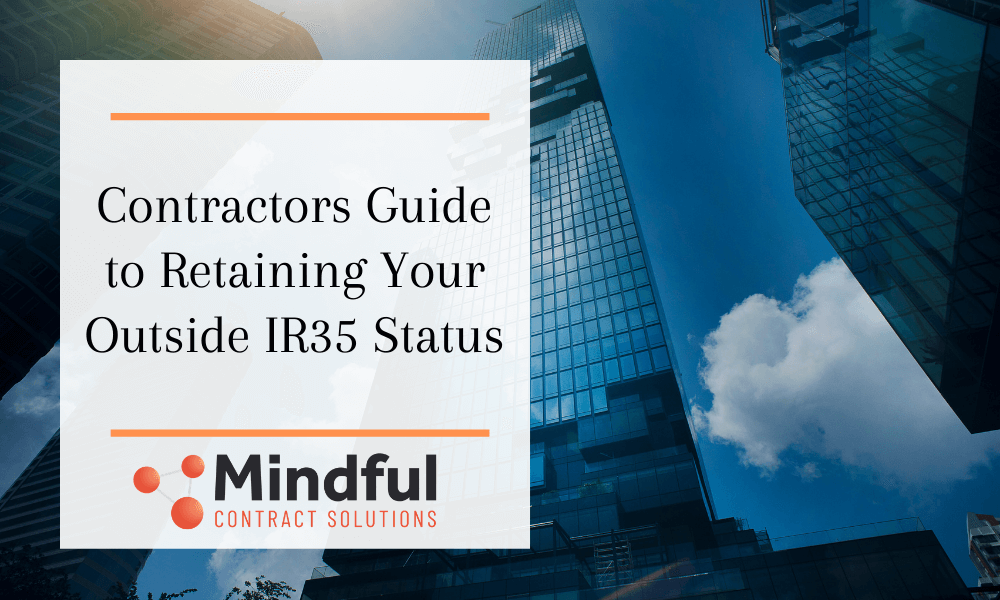Employers in the public sector are responsible for determining the IR35 status of their contractors, and this is set to extend to the private sector in April 2021.
As a contractor, it is vital that you pay attention to these new rules.
If not, it could prove to be very costly, both in terms of your earnings and the tax you pay.
However, it is not completely in the hands of the client to decide your status…
In this guide, we explore some of the steps you can take to retain your outside IR35 status.
1) Are You Substitutable?
Including a right of substitution in a contract is a silver bullet to IR35 and will help keep you outside IR35. All you have to do is prove that you could substitute, or that you would.
This is quite a simple step but one of the best ways to defend any challenges.
What is Substitution?
As a contractor you are providing a service, thus you should be substitutable. This means that if you are unable to fulfil your work requirements for any reason, you should be able to provide another contractor in your place.
For this to be valid, the client must agree to this and sign a contract to diminish the right to vet the contractor. The client would not pay the substitute, rather they would pay you and you will pay the substitute. This needs to be very clear in the contract.
If you are not substitutable, it could be argued that you are an employee of the company as they are hiring you and not your service. Having substitution friendly clauses in the contract is great, but usually not enough.
The working practices also have to support and allow for substitution. Ask yourself how your client would react if you proposed to substitute yourself with someone else. Has your right of substitution been sitting in your contract, but never been a subject of conversation with your client point of contact? If yes, chances are your client will not be open to that possibility.
How does Substitution impact Your IR35 Status?
Questions around substitution in the CEST tool have a very high impact on the eventual assessment. If a hirer responds respond “no” when asked “do you have the right to reject a substitute?” it considerably increases the likelihood that your role as a contractor being decided as outside of IR35.
“One of the key tests of employment status for tax is substitution – whether the firm would accept a substitute for the contractor if the need arises.” – Our Director (Amit Kapoor) speaking to People Management in their ultimate guide to private sector off-payroll changes.
2) Be Aware of the Blurred Lines
It can be difficult to handle this situation without coming across as rude or having to announce your IR35 status as a way of getting out of the situation.
Plan your reaction to these situations so you can maintain your IR35 status, while still maintaining good relations with your colleagues. For example, if you are asked to replace an employee, you might want to respond by saying “I don’t think I have the expertise for that”.
Alternatively, if you are invited to an event you might want to say you are tied up with deadlines. If you get your responses in check, it’ll make it easier to handle these challenging situations and to retain your outside IR35 status.
If the frequency of such polite invitations doesn’t subside, it’s best to have a heart-to-heart with your manager as a separate discussion. It is probably best to have this conversation at a time when they aren’t waiting for you to respond to an invitation.
Want to upskill as a contractor without taking a hit on your billable days? Head over to our blog post, How To Upskill As A Contractor (Without Compromising Billability).
3) Behave Like a Supplier
As a contractor, you are not a decision maker in the organisation, so don’t act like one. You can advise and recommend but you shouldn’t be making decisions.
Another way to see your role is to try – and try hard – but not be attached to the outcome. At the end of the day the decision rests with the client organisation. You need to constantly remind yourself that you are a supplier. You are external to the business but you are there to support them. Get used to couching your views as your “professional opinion” or your “recommendation”.
A further recommendation is to amend your signature to indicate your contactor status. Putting a (contractor) or (independent) at the end may cause clients to object on the grounds that you are sending confusing messages to their stakeholders. So, perhaps just slip in an (ext) aka “external” at the end.
Finally, it is good practice to have your own website. Setting up one is not too onerous. One page websites are a thing. If you wish to use the provider we use, take a look at one.com to get started.
Head over to our blog post, 3 Working Practices To Build An Impenetrable IR35 Defence to find out more about building an impenetrable IR35 defence.
Where Do You Go From Here?
Substitution has been proven time and again in courts to be a very strong indicator of self-employment.
However, without an actual exercising of that right, standing up your entire defence on a hypothetical argument alone can be foolhardy.
Beefing up other pointers to self-employment will help immensely with the argument that you are a business, and not an individual.
If you liked this content and found it helpful, please do consider following us on LinkedIn.

